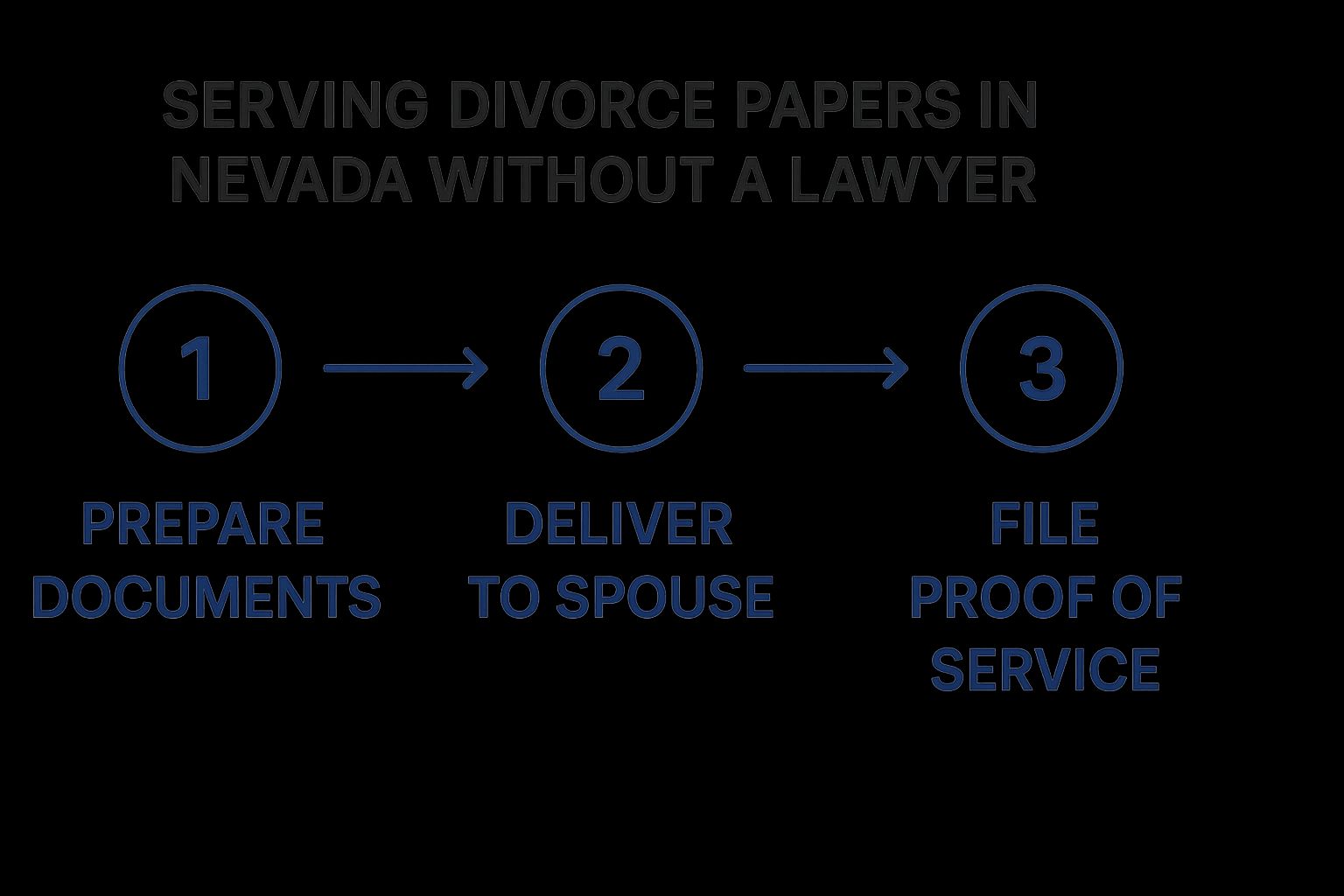How to File for Divorce in Nevada Without a Lawyer – Easy Guide
- WebsiteFix Technical Partner
- Aug 6, 2025
- 16 min read
Filing for a DIY divorce in Nevada might sound daunting, but it’s a surprisingly straightforward path if you and your spouse are on the same page. The entire process hinges on meeting the state's residency rules and filing the right paperwork for what's called an uncontested divorce. When you both agree on all the terms, a Joint Petition for Divorce becomes your ticket to a faster, more affordable separation.
Your Guide to a Nevada DIY Divorce

Let's be honest, navigating a divorce is never easy. But in Nevada, handling it yourself is a realistic and empowering option, particularly when you and your spouse have already agreed on the big picture. This guide is here to walk you through it, step by step, so you can manage the process without the hefty price tag of a lawyer. When you take the lead, you stay in control of both the timeline and the final agreement.
The cornerstone of any successful DIY divorce is mutual agreement. If you can iron out the details on property, debt, and—if you have children—custody and support, you can file a Joint Petition. This is, by far, the simplest and quickest way to get divorced in Nevada because it tells the court there's nothing left to argue about.
Nevada DIY Divorce Key Requirements at a Glance
Before diving in, it's helpful to see the main requirements at a glance. This table breaks down the essentials you'll need to satisfy to file for an uncontested divorce on your own in Nevada.
Requirement | Details |
|---|---|
Residency | At least one spouse must have physically lived in Nevada for a minimum of 6 weeks before filing. |
Grounds for Divorce | Nevada is a no-fault state. You only need to state incompatibility or that you've lived apart for 1 year. |
Mutual Agreement | You and your spouse must agree on all issues: assets, debts, child custody, visitation, and support. |
Proper Paperwork | You must complete and file a Joint Petition for Divorce, which outlines all terms of your agreement. |
Meeting these core requirements sets the stage for a smooth, uncontested process that you can manage without needing to appear in court.
Making the Process Easier with Modern Resources
In the past, a DIY divorce meant deciphering confusing legal forms all by yourself. Thankfully, that’s no longer the case. A handful of modern services have made filing for divorce in Nevada without a lawyer more manageable than ever, shifting the process from frustrating paperwork to streamlined digital steps.
Here are a few virtual and mobile resources that can make a real difference:
Online Document Preparation: Remote services designed for this purpose will walk you through a series of questions to generate the correct, court-approved divorce papers. This is a game-changer for avoiding the common mistakes that can get your filing rejected, all from the comfort of your home.
Remote Online Notarization (RON): This is a huge time-saver. You can get your divorce documents legally notarized from anywhere through a secure video call with a licensed Nevada notary. No more hunting for a notary and coordinating schedules.
Mobile Notary Services: If you still prefer signing in person but can't make it to an office, a mobile notary will come to your location. It’s the perfect blend of traditional service and modern convenience, bringing the notary directly to your doorstep.
These tools are all about giving you the confidence to handle this sensitive legal matter privately, securely, and on your own terms.
Nevada's approachable divorce laws have shaped its reputation. In fact, the state's legal framework is a key reason it had the highest divorce rate in the country in 2021, at 4.2 divorces per 1,000 females. This statistic highlights just how common and accessible the DIY divorce route is here. You can see more data on these trends at World Population Review.
Are You Eligible for a Nevada Divorce? First Things First.

Before you even think about downloading forms or divvying up assets, you have to answer one crucial question: can you legally file for divorce in Nevada? Getting this wrong means the court can dismiss your case, sending you right back to square one after wasting precious time and money.
The absolute cornerstone of a Nevada divorce is residency. At least one of you must have physically lived in the state for a minimum of six consecutive weeks right before filing the paperwork. Where you got married doesn't matter at all—it’s all about where you've been living recently.
How to Prove You're a Nevada Resident
The court won't just take your word for it. You’ll need a third-party adult to sign an Affidavit of Resident Witness. This person is essentially vouching for you, swearing under penalty of perjury that they know for a fact you've been in Nevada for the required time.
Your resident witness needs to be:
A Nevada resident themselves.
Someone who has seen you in Nevada regularly (not just once or twice) for at least six weeks.
Anyone other than your soon-to-be-ex-spouse.
A friend, a neighbor, a coworker, or even a relative can do this for you. Their signed and notarized affidavit becomes a critical piece of evidence that you'll file along with your initial divorce petition. This is often one of the first documents you'll need notarized. Fortunately, with options like remote online notarization, your witness can get this done from their own computer, which is a huge time-saver. A mobile notary can also travel directly to them.
Expert Insight: Physical presence is key. The court needs proof that you or your spouse were actually living here, not just using a mailing address. They want to see that Nevada is genuinely your home, even if it's been for just over a month.
Understanding Nevada's "No-Fault" System
One of the best things about getting divorced here is that Nevada is a "no-fault" state. This dramatically simplifies things. You don't have to air your dirty laundry or prove that your spouse did something terrible like have an affair or abandon the family.
You only need to state one of two grounds for the divorce on your forms:
Incompatibility: This is what nearly everyone uses. It’s the legal way of saying, "We just don't get along anymore, and there's no chance we'll get back together."
Living Separate and Apart for One Year: If you've already been living in different homes for a full year or more, you can use this as your reason.
The no-fault system is what makes a DIY divorce in Nevada so manageable. It sidesteps the need for ugly, expensive court battles over who is to blame for the marriage ending.
The Fork in the Road: Joint Petition vs. Complaint
For anyone hoping to handle their divorce without a lawyer, this next choice is everything. It will define how simple—or how complicated—the entire process will be.
Joint Petition (Uncontested): This is the gold standard for a DIY divorce. It means you and your spouse are on the same page about everything. You’ve already agreed on how to divide property and debts and have a plan for child custody and support. You file the paperwork together as a team.
Complaint for Divorce (Contested): This is the opposite. One spouse sues the other for divorce because you can't agree on one or more issues. This route is a minefield of legal procedures, from formally serving your spouse with papers to attending court hearings. It's incredibly difficult to navigate on your own.
Filing a Joint Petition essentially tells the judge, "We are adults, and we've worked this out." It’s by far the fastest and cheapest way to end a marriage. To make sure you don't miss any steps along the way, a solid checklist is invaluable. Our ultimate printable divorce checklist maps out the entire process for 2025.
It’s no secret that Nevada has lenient divorce laws, which contributes to its reputation. In 2021, the state had the highest divorce rate in the U.S. at 4.2 per 1,000 people. This statistic reflects how accessible the process is, making Nevada a unique place when it comes to marital laws.
Getting Your Paperwork Right: Preparation and Notarization
The paperwork is really the heart of your DIY divorce. This is where you translate your agreements into a legally sound document, and getting it right from the start saves a world of headaches down the road. For a Joint Petition, you'll mainly be working on the Petition itself and the final Decree of Divorce. The key to making this stage feel manageable, not overwhelming, is to lean on modern tools that are built for this very purpose.
When you file for divorce in Nevada without a lawyer, you're the one responsible for making sure every detail is perfect. I’ve seen cases get kicked back by the court for the smallest things—a missed signature, a wrong date, or a single unchecked box. That rejection forces you to start the whole process over. This is exactly why specialized online document preparation services are such a lifesaver.
Why Online Document Preparation Is Your Best Bet
Instead of trying to decipher complex legal forms on your own, think of an online document preparation service as your personal digital assistant. These virtual platforms walk you through a simple, guided questionnaire about your situation. You’ll answer questions about your assets, debts, and any agreements you’ve made about your children, and the service uses that information to generate the exact, court-approved forms you need.
This remote approach gives you a few major advantages:
Pinpoint Accuracy: The software is always updated with current Nevada legal requirements, ensuring all the necessary language and clauses are automatically included. This dramatically lowers the chance of the court rejecting your filing.
Total Completeness: It helps you remember things you might otherwise forget, like how to properly list a 401(k) or structure a clear and enforceable parenting plan.
Unbeatable Convenience: You can do everything from home, working around your own schedule. No appointments, no travel, no hassle.
It’s a lot like using TurboTax instead of filling out IRS forms by hand. The service guides you, ensuring you cover all your bases and giving you a much higher probability of the judge approving your paperwork on the first submission.
This infographic breaks down the basic flow of preparing your documents and getting them finalized.

This visual shows how getting the documents right is the foundation. It’s the first critical step that allows for a smooth signature process with your spouse and, ultimately, a successful filing with the court.
The Modern Way to Notarize Your Documents
Once your documents are prepared and ready, they need to be signed and notarized. For a Joint Petition, both you and your spouse have to sign in front of a notary public. A few years ago, this was a logistical pain, requiring you both to coordinate schedules and trek to a physical notary office. Thankfully, we now have much better, more flexible options.
A Word of Caution: The notarization step is absolutely mandatory. The court will not accept a divorce petition with an unnotarized signature. This official verification proves you are who you claim to be and that you are signing the documents willingly.
The way notary services have evolved has been a true game-changer, especially for people handling their own legal matters. You don’t have to blow up your whole day just to get a signature witnessed anymore.
Finding a Notary That Fits Your Life: Virtual and Mobile Options
Two services, in particular, have made notarization incredibly accessible, which is a huge benefit when you're navigating a Nevada divorce without an attorney.
Remote Online Notarization (RON)This is, by far, the most efficient method today. You connect with a licensed Nevada notary through a secure video call from literally anywhere. You'll hold up your ID to the camera to verify your identity, then electronically sign the documents as the notary watches and applies their official digital seal. It's a completely legal and binding process that can save you a ton of time. For a full breakdown, check out this comprehensive guide on how to get documents notarized online.
Mobile Notary ServicesIf you still prefer signing a physical paper document but can't get to an office, a mobile notary is the perfect hybrid solution. A certified notary public will come to you—whether that’s your home, your office, or a local coffee shop—to witness your signature in person. This service blends convenience with a personal touch, taking all the travel and scheduling headaches off your plate. It's especially useful if you and your spouse need to sign at different times or locations; the notary can simply travel to each of you separately.
Filing Your Paperwork and Finalizing the Divorce

You’ve done the hard work of preparing and notarizing your documents. This is it—the final administrative stretch of your DIY divorce. The focus now shifts from negotiation to pure procedure: getting your paperwork officially filed with the court and in front of a judge for that final, crucial signature.
When you file a Joint Petition, you're signaling to the court that you've already reached a complete agreement. With no disputes left to resolve, a judge can typically sign off on your divorce just by reviewing the papers. This is a huge advantage of the uncontested route, as it almost always means you won’t have to see the inside of a courtroom.
Submitting Your Documents to the Court
You've got a couple of ways to get your divorce packet into the hands of the right district court in Nevada. Your choice really boils down to convenience and what you're most comfortable with.
E-Filing: Most courts in Nevada, including the high-volume Clark County Family Court, have an electronic filing system. This is by far the fastest method. You can upload your signed, notarized documents from home and get instant confirmation that the court has received them.
In-Person Filing: If you’d rather handle things the old-fashioned way, you can always take your original documents and copies down to the court clerk's office. A clerk will review your packet, stamp everything, assign a case number, and officially file your case.
No matter how you file, you’ll have to pay the court's filing fee. This fee isn't set in stone; it can vary between counties and change over time, so it's smart to check your local district court's website for the most current amount. For perspective, in early 2024, the filing fee in Clark County was about $299. If that fee is a hardship, you can ask the court to waive it by filing an Application to Proceed in Forma Pauperis.
A Pro Tip from Experience: Before you file a single page, make at least two full copies of your entire set of documents. The court keeps the originals you submit. You'll want one copy for your personal records and another for your spouse. Don't skip this step.
The Final Step: The Judge's Review
Once filed, your Joint Petition makes its way to a judge's desk. Along with it, you'll submit the proposed Decree of Divorce—the document that will legally dissolve your marriage once signed. The judge's job is to ensure everything is in order, your agreement is fair and equitable, and all of Nevada's legal requirements have been met, paying special attention to any provisions for children.
Because you and your spouse have already agreed on every detail, the judge’s role is mostly to give that final legal stamp of approval. In a smooth, uncontested case, this review can happen fairly quickly and without a hearing.
When the judge signs your Decree of Divorce, it gets entered into the official court record. This is the moment your divorce becomes legally binding.
Receiving Your Final Divorce Decree
So, how do you know it's all over? The court clerk will mail you a conformed copy of the signed Decree of Divorce. But the single most important document you'll receive is the Notice of Entry of Decree. This is a separate form issued by the clerk that serves as the official, final notification that your divorce has been granted. The date on this notice is your official date of divorce.
Guard these documents carefully. You'll need them for all sorts of post-divorce logistics, like:
Changing your last name on your Social Security card and driver's license
Updating beneficiaries on life insurance and retirement accounts
Removing your ex-spouse from health insurance policies
Refinancing your home or applying for a new loan
Successfully learning how to file for divorce in Nevada without a lawyer comes down to staying organized, especially in this final stage. By keeping good records and following the court’s process, you can confidently cross the finish line and begin your next chapter.
Getting the Agreement Right: Property, Debt, and Children
Even when a split is amicable, the real work begins when you start putting your verbal agreements on paper. This is where you address the big three: your property, your debts, and—most importantly—your children. Getting this part right is absolutely essential when you're filing for divorce in Nevada without a lawyer, as your written agreement becomes a legally binding court order.
Let's start with a crucial concept you need to understand: Nevada is a community property state. What does that mean in plain English? Essentially, almost any asset or debt you acquired while married is considered to belong to both of you equally. It doesn't matter whose name is on the bank account or the car title.
Dividing Your Assets and Debts Fairly
In a community property state, the default is a 50/50 split. This rule applies to everything from your house and cars to bank accounts and retirement funds like a 401(k). The same goes for debts—mortgages, car loans, and credit card balances accumulated during the marriage are also considered joint obligations.
Your first practical step is to create a detailed inventory. List every single asset and every single liability. You'll need to assign a current market value to each item before you can decide how to divide them.
Assets: Will one of you keep the house and buy out the other's share of the equity? Are you selling the family car and splitting the money?
Debts: Who is taking responsibility for that joint credit card balance? How will the mortgage be paid after the divorce is final?
Putting these decisions in writing is non-negotiable. It creates a clear, court-enforceable roadmap that prevents future fights and financial messes. As you work through this, remember to consider the tax implications of divorce, which can be significant.
A Quick Tip from Experience: A "fair" division doesn't always mean selling everything and splitting the cash. Often, it's more practical for one spouse to take a major asset (like the house) while the other takes assets of similar value (like a larger portion of a retirement account).
Creating a Solid Plan for Your Children
When you have minor children, your divorce agreement must include a comprehensive plan for their care and financial support. This isn't just a good idea; it's a legal requirement. Nevada courts always put the children's best interests first.
Your plan must clearly spell out:
Custody Arrangements: Who makes the major life decisions, and where will the children live?
Parenting Time (Visitation): A detailed schedule covering regular days, holidays, and vacations.
Financial Support: This includes monthly child support payments and who is responsible for providing health insurance.
Understanding Custody and Child Support in Nevada
Nevada law recognizes two types of custody. Legal custody is about the authority to make major decisions regarding your child’s health, education, and religion. Courts here have a strong preference for joint legal custody, meaning both parents share in that decision-making process.
Physical custody determines where the child primarily resides. You might have joint physical custody, where the child spends significant time with both parents, or primary physical custody, where the child lives mostly with one parent while the other has specific visitation time.
Child support isn't a number you just guess at. It's determined by a specific formula outlined in the Nevada Child Support Guidelines. The calculation takes several factors into account:
Each parent's gross monthly income
The physical custody schedule
The number of children you have
To get a reliable estimate, it's a good idea to use Nevada's official Child Support Guideline Calculator. Your final decree must align with these state-mandated calculations.
While it's incredibly empowering to handle your divorce yourself, some situations have higher stakes. If your finances are complex or you're wrestling with custody details, getting a professional second opinion can be a smart move. Exploring affordable options for managing divorce legalities, like hiring an attorney for a one-time review of your final paperwork, offers incredible peace of mind. It's a small investment to ensure your DIY agreement is solid, especially when your financial future and your children's well-being are on the line.
Navigating a DIY divorce in Nevada yourself is smart, but it's natural to have questions pop up along the way.I've walked many people through this process, and a few common concerns always surface. Let's tackle them head-on with some straightforward, real-world answers.
How Long Does a DIY Divorce Really Take in Nevada?
This is the number one question I get, and the answer is one of the biggest benefits of handling it yourselves. For a straightforward, uncontested Joint Petition, the timeline can be surprisingly quick. Once you file your properly signed and notarized paperwork, you could have a final, signed decree from a judge in as little as one to three weeks.
That’s a far cry from a contested divorce, where you and your spouse are at odds. Those cases can easily get bogged down for months—sometimes years—as lawyers go back and forth. The secret to a fast resolution is getting on the same page about everything before you file.
What Happens If My Spouse Won't Sign the Papers?
This is a common and critical roadblock. If your spouse refuses to sign a Joint Petition, the easy, uncontested route is unfortunately off the table. Your only option at that point is to file a Complaint for Divorce.
Filing a Complaint changes the entire dynamic. It becomes a more adversarial process where you have to legally "serve" your spouse with the papers, which has its own set of strict rules. This path often involves court hearings and is much more difficult to navigate without professional help. If you find yourself here, I strongly suggest getting at least a consultation with an attorney to understand what you're up against.
Can We Still Do This Ourselves if We Have Kids?
Absolutely. In fact, this is when getting some professional help with the paperwork is even more crucial. A reputable online document preparation service is well-equipped to handle divorces involving minor children.
These virtual platforms are designed to walk you through all the critical details that Nevada law requires, ensuring nothing is missed. This includes:
Custody: Defining who has legal and physical custody.
Parenting Plan: Creating a clear, practical schedule for visitation, holidays, and school breaks.
Child Support: Calculating the right amount based on state guidelines, so it’s fair and legally compliant.
Using a remote service that specializes in this gives you peace of mind that these vital parts of your agreement are solid. Believe me, the judge will be scrutinizing this part of your decree very carefully.
What Should I Budget for a DIY Divorce?
Choosing the DIY path is a huge money-saver. You get to sidestep the hefty retainer and hourly fees that come with hiring an attorney, which can run into thousands of dollars almost immediately. Your costs will be much lower and more predictable.
Your main expenses are the court's filing fee, which is around $300 in most Nevada counties, plus the cost of getting your documents prepared and notarized. Even with professional document services, your total outlay will be a tiny fraction of a traditional attorney-led divorce.
Modern services have also made these steps incredibly convenient. Instead of trying to get everyone in the same room at the same time for a notary, you can use a Remote Online Notary (RON) and get it done over a secure video call. Or, if you want that in-person touch without the travel, a mobile notary can meet you wherever you are. These options are built for real life, fitting your schedule and budget so you can focus on moving forward.
When you're ready to get your divorce documents prepared correctly and notarized without the hassle, Signature on Demand provides the professional support you need. We create court-ready divorce packets and offer 24/7 mobile and remote online notary services to make the process as smooth as possible. Visit us at https://signatureondemand.net to learn how we can help you finalize your Nevada divorce with confidence.




Comments